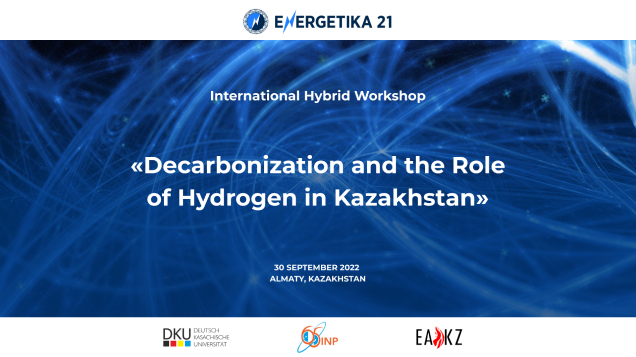The International workshop “Decarbonization and the Role of Hydrogen in Kazakhstan” was held on 30 September 2022 in Almaty in hybrid format and served as a preparatory discussion towards the International scientific conference ‘’Energetika 21: Economy, Policy, Ecology’’. The co-organisers of the workshop were the Kazakh-German University (DKU), Aspects of Kazakhstan Analytical Centre (EAKZ) and Institute of Nuclear Physics (Kazakhstan).
Kazakhstan is known for ambitious goals to reduce its greenhouse gas emissions to below 85% of their 1990 levels by 2030 and achieve carbon neutrality by 2060. This will require major change in the role of existing fuels like coal, which provides 70% of electricity production and substantial investment into increasing efficiency of existing energies and into developing low carbon energy like renewables or fossil energy with CCUS. The Draft Doctrine (Strategy) of Achieving Carbon Neutrality of Kazakhstan until 2060 is undergoing a revision and discussion process. Kazakhstan has an impressive geological basis of fossil fuels and a large potential for renewables mainly in its Western and Southern part. Kazakhstan has managed export of oil and wants to export CO2 free energies like green hydrogen in the future.
In the welcoming speech towards participants of the workshop, the Minister of Energy of the Republic of Kazakhstan Bolat Akchulakov emphasized that only an open dialogue of all parties involved can bring real results to the energy of the future, as decarbonisation of national economies has areas of common interest.
The Managing Director – director of Department of Basic Industries and Ecology in “Atameken”– the Kazakhstan National Chamber of Entrepreneurs Dinmuhammed Kudaibergenov outlined the critical threats and opportunities for Kazakhstan economic sectors in the context of decarbonisation strategy. In particular, a net-zero target creates challenges for the country in its profound economy transformation. The main challenge will be the energy transition – replacing coal generation with alternative energy sources and renewables. This requires huge investment costs and flexible energy sources in Kazakhstan energy system, a transit of industry and transport to environmentally friendly energy sources (methane, biofuel and hydrogen), including the transition period. At the same time, rich fossil fuel and mineral resources create competitive advantage and economy development, that requires more balanced approaches while choosing decarbonisation policies in the line with each separate economic sector.
The workshop addressed the challenges of decarbonization in the context of international experience. The speaker from the European University at St. Petersburg Irina Mironova presented the world trends of decarbonisation in coal industry. Hans Jorgen Koch (the former Director General, Danish Ministry of Energy) and Ralf Dickel (former director on transit and trade, The Energy Charter Secretariat) shared their experience and decarbonisation challenges of Nordic countries and Germany in particular.
The speakers Galymzhan Mamytbekov (The Institute of Nuclear Physics) and Ainur Tumysheva (Svevind Energy GmbH) presented the modern Kazakh projects on hydrogen generation. Meanwhile, the prospects for Kazakh hydrogen export in line with the technology development of its storage and transportation were introduced in details by the Independent expert Yuriy Melnikov, the expert of Oxford Institute for Energy Studies Julian Bowden and Director General of Linde Gas Kazakhstan Batyrzhan Tergeussizov. The experts have agreed that the Kazakhstan hydrogen program requires more precise goal-setting (e.g. an instrument for achieving net-zero or a product of export), stronger connection to decarbonisation strategy (in particular, stimulating domestic H2 demand) and more elaborate choice of export routes (most likely China).
It’s worth mentioning that the workshop was a great success. More than 80 participants (35 offline and 45 online) from Kazakhstan, Russia, Germany, Denmark, the UK and other countries joined the workshop.
Previous ENERGETIKA conferences and workshops programs, presentations and photos are available at: https://energetika.unecon.ru/archive








